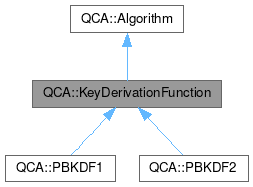QCA::KeyDerivationFunction
#include <QtCrypto>

Public Member Functions | |
| KeyDerivationFunction (const KeyDerivationFunction &from) | |
| SymmetricKey | makeKey (const SecureArray &secret, const InitializationVector &salt, unsigned int keyLength, int msecInterval, unsigned int *iterationCount) |
| SymmetricKey | makeKey (const SecureArray &secret, const InitializationVector &salt, unsigned int keyLength, unsigned int iterationCount) |
| KeyDerivationFunction & | operator= (const KeyDerivationFunction &from) |
 Public Member Functions inherited from QCA::Algorithm Public Member Functions inherited from QCA::Algorithm | |
| Algorithm (const Algorithm &from) | |
| void | change (const QString &type, const QString &provider) |
| void | change (Provider::Context *c) |
| Provider::Context * | context () |
| const Provider::Context * | context () const |
| Algorithm & | operator= (const Algorithm &from) |
| Provider * | provider () const |
| Provider::Context * | takeContext () |
| QString | type () const |
Static Public Member Functions | |
| static QString | withAlgorithm (const QString &kdfType, const QString &algType) |
Protected Member Functions | |
| KeyDerivationFunction (const QString &type, const QString &provider) | |
 Protected Member Functions inherited from QCA::Algorithm Protected Member Functions inherited from QCA::Algorithm | |
| Algorithm () | |
| Algorithm (const QString &type, const QString &provider) | |
Detailed Description
General superclass for key derivation algorithms.
KeyDerivationFunction is a superclass for the various key derivation function algorithms within QCA. You should not need to use it directly unless you are adding another key derivation capability to QCA - you should be using a sub-class. PBKDF2 using SHA1 is recommended for new applications.
Definition at line 953 of file qca_basic.h.
Constructor & Destructor Documentation
◆ KeyDerivationFunction() [1/2]
| QCA::KeyDerivationFunction::KeyDerivationFunction | ( | const KeyDerivationFunction & | from | ) |
Standard copy constructor.
- Parameters
-
from the KeyDerivationFunction to copy from
◆ KeyDerivationFunction() [2/2]
|
protected |
Special constructor for subclass initialisation.
- Parameters
-
type the algorithm to create provider the name of the provider to create the key derivation function in.
Member Function Documentation
◆ makeKey() [1/2]
| SymmetricKey QCA::KeyDerivationFunction::makeKey | ( | const SecureArray & | secret, |
| const InitializationVector & | salt, | ||
| unsigned int | keyLength, | ||
| int | msecInterval, | ||
| unsigned int * | iterationCount ) |
Generate the key from a specified secret and salt value.
- Note
- key length is ignored for some functions
- Parameters
-
secret the secret (password or passphrase) salt the salt to use keyLength the length of key to return msecInterval the maximum time to compute the key, in milliseconds iterationCount a pointer to store the number of iteration done for the specified time
- Returns
- the derived key
◆ makeKey() [2/2]
| SymmetricKey QCA::KeyDerivationFunction::makeKey | ( | const SecureArray & | secret, |
| const InitializationVector & | salt, | ||
| unsigned int | keyLength, | ||
| unsigned int | iterationCount ) |
Generate the key from a specified secret and salt value.
- Note
- key length is ignored for some functions
- Parameters
-
secret the secret (password or passphrase) salt the salt to use keyLength the length of key to return iterationCount the number of iterations to perform
- Returns
- the derived key
◆ operator=()
| KeyDerivationFunction & QCA::KeyDerivationFunction::operator= | ( | const KeyDerivationFunction & | from | ) |
Assignment operator.
Copies the state (including key) from one KeyDerivationFunction to another
- Parameters
-
from the KeyDerivationFunction to assign from
◆ withAlgorithm()
|
static |
Construct the name of the algorithm.
You can use this to build a standard name string. You probably only need this method if you are creating a new subclass.
- Parameters
-
kdfType the type of key derivation function algType the name of the algorithm to use with the key derivation function
- Returns
- the name of the KDF/algorithm pair
The documentation for this class was generated from the following file:
Documentation copyright © 1996-2025 The KDE developers.
Generated on Fri May 2 2025 12:01:48 by doxygen 1.13.2 written by Dimitri van Heesch, © 1997-2006
KDE's Doxygen guidelines are available online.